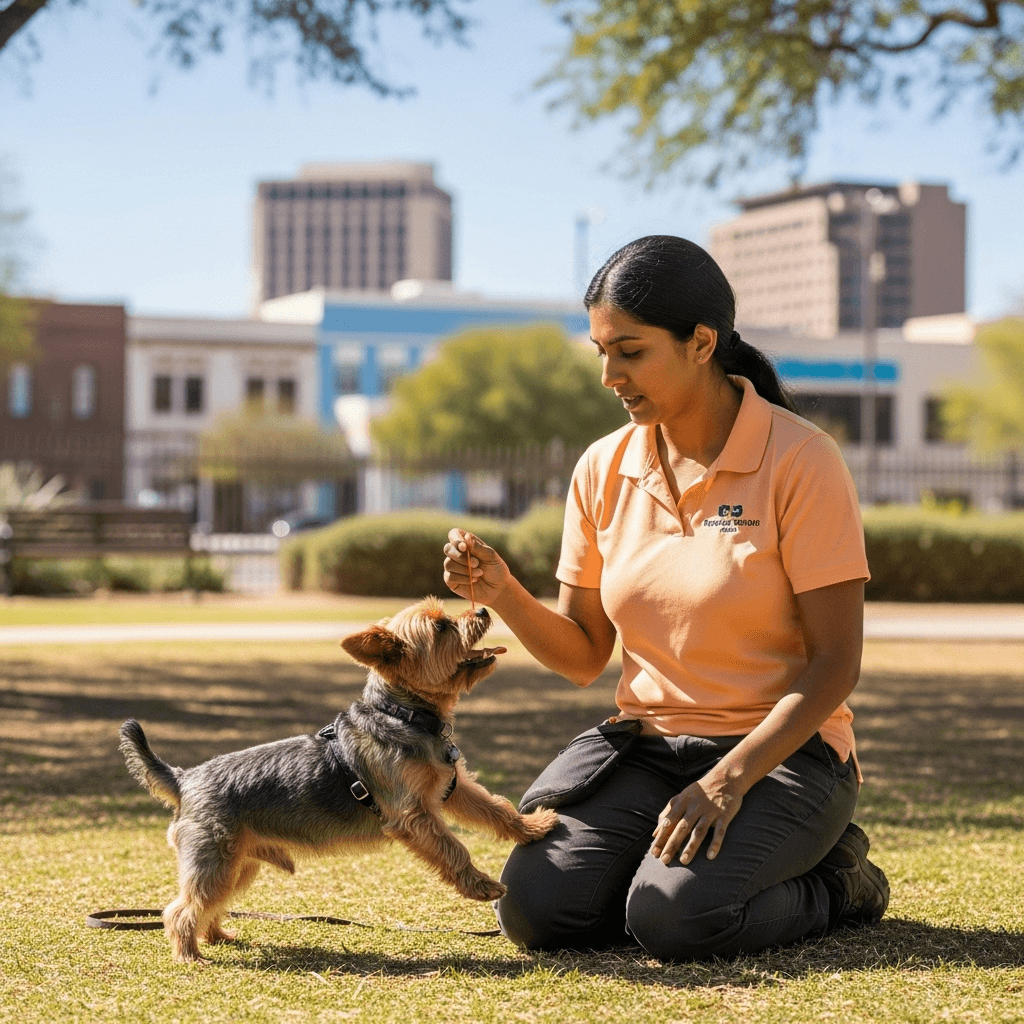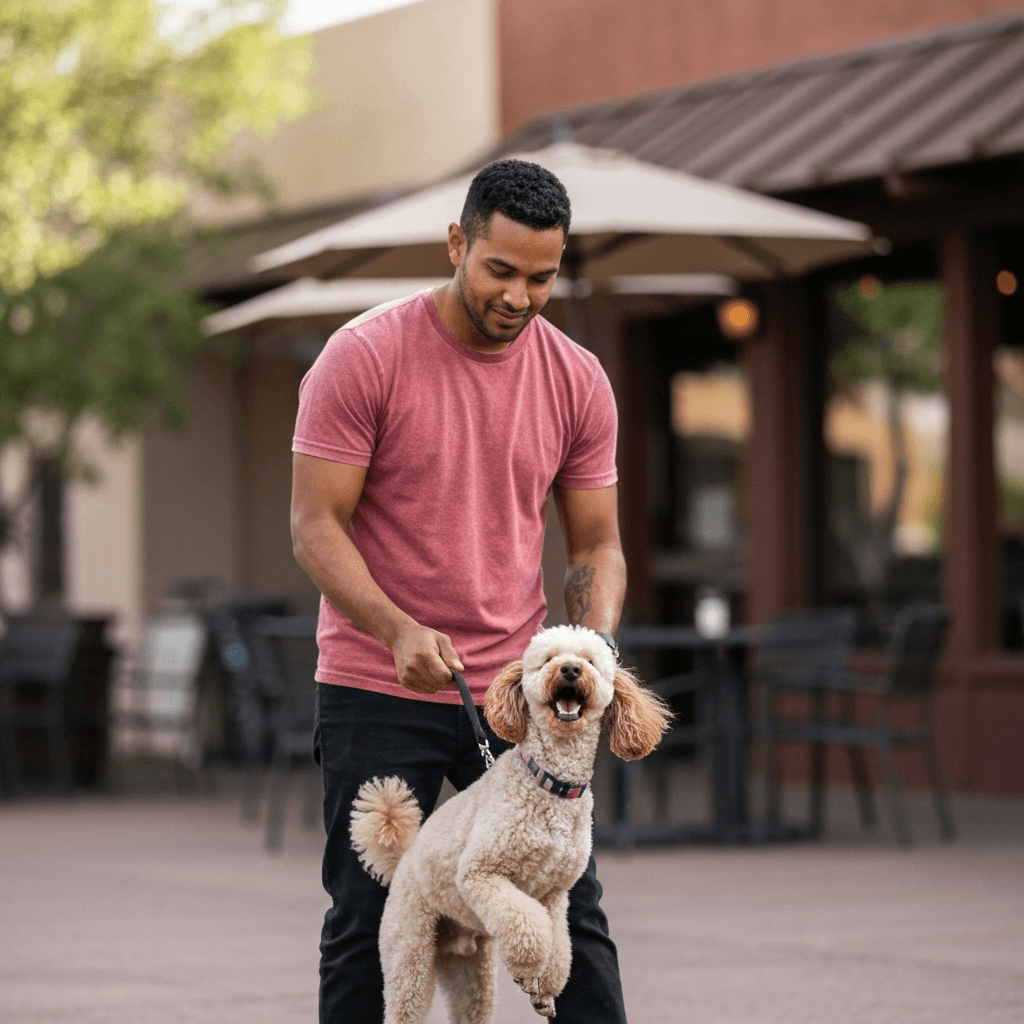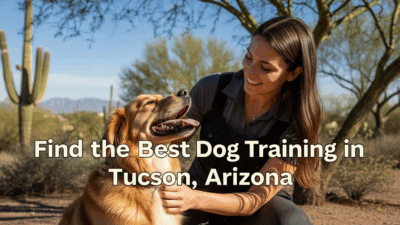Your Complete Guide to Choosing a Dog Trainer in Tucson AZ and Surrounding Areas
Living with a dog in Tucson means navigating desert-adapted wildlife encounters, hot pavement on summer walks, and busy trails at Sabino Canyon or Rillito River Park. Your dog needs to stay calm when cyclists speed past, ignore loose quail darting across paths, and handle crowded Saturday mornings at coffee shops on Fourth Avenue.
Since Tucson sits in Pima County, local rules follow city ordinances and county health requirements. When you find a trainer who understands these desert-city details, you’ll get better results both at home and out in your community.
How to Choose the Right Trainer
Start by looking for someone who uses positive reinforcement training and can set realistic goals for your Tucson lifestyle. This means your dog should learn to walk calmly through busy neighborhoods like Sam Hughes or Armory Park, stay focused near university crowds, and handle outdoor restaurant patios without drama.
Credentials give you a quick way to compare trainers’ experience levels. Common dog trainer certifications include KPA-CTP, CPDT-KA, or IAABC-CDBC for behavior problems. If your dog has serious aggression or reactivity issues, look for someone with CBCC-KA or a science-based program like CTC.
In-home dog training works great for puppy manners, door greetings, and neighborhood leash skills specific to your street. Group classes make sense once your dog can focus around other dogs, especially before you try busy spots like Reid Park or downtown events.
Common Dog Training Methods Explained

Reward-based methods build the trust you want while creating lasting behavior changes. They also help you follow Tucson’s rules about keeping dogs under control in public.
Basic obedience covers sit, down, stay, place, recall, and leash training so your dog can handle walks, brewery patios, and park visits without pulling or jumping on people. These skills become essential when you’re navigating crowded spots near the University of Arizona or dealing with sudden wildlife appearances.
Puppy training focuses on socialization, potty training, bite control, crate comfort, and early leash work. Starting with short, positive training sessions prevents bad habits from forming in the first place. Desert puppy training also means teaching your young dog to avoid cactus, check pavement temperature with their paws, and stay calm around javelina sightings.
Behavior modification addresses fear, reactivity, resource guarding, or separation anxiety through careful desensitization and counterconditioning. For serious cases, ask if your professional dog trainer works with local veterinarians who understand behavior medication options.
Private lessons and in-home sessions let you customize everything around your daily routines, while day training can speed up results when you’re short on time. Some expert dog trainers offer flexible scheduling that works around Tucson’s intense summer heat patterns.
Group classes help your dog practice good manners around other dogs and people. The best dog training classes give dogs plenty of space, screen participants carefully, and teach calm behavior rather than just excitement. Look for programs that schedule early morning or evening sessions during summer months.
Specialized service dog training or therapy dog training requires extra structure, public-access skills, and a very clear step-by-step training program. These programs demand higher standards than basic obedience training.
Stay away from trainers who use fear, intimidation, or pain to get results. Humane methods are safer for everyone, easier to maintain long-term, and much better for keeping peace with your neighbors in tight urban areas like the Catalina Foothills or central Tucson.
Average Cost of Dog Training in Tucson AZ (Updated for 2025)
Prices around Tucson and Pima County depend on the trainer’s experience, how long sessions last, and where the training happens. Here’s what most local pet owners are paying in 2025.
| Service Type | Average Cost (Tucson/Pima County) |
|---|---|
| Puppy classes (4-6 weeks) | $140-$260 total |
| Group obedience classes (4-6 weeks) | $150-$285 total |
| Private lessons (60-90 min) | $100-$175 per session |
| In-home coaching packages (4-6 visits) | $400-$850 total |
| Day training (trainer works your dog + handoff) | $425-$900 per week |
| Behavior consult for reactivity/anxiety (initial) | $140-$240 |
| Board and train (2-4 weeks) | $1,900-$4,200 total |
You’ll probably pay extra travel fees for longer distances within Pima County, and expect higher rates for complex aggressive dog training or separation anxiety work.
Make sure you understand what’s included, how the trainer tracks progress, and whether they offer a free consultation before you sign up. Many Tucson trainers also offer a free evaluation to assess your dog’s specific needs.
Questions to Ask a Potential Dog Trainer
- What training methods do you use, and how do you keep training sessions positive and low-stress?
- What credentials do you have, like KPA-CTP or CPDT-KA? Do you keep up with continuing education such as CPDT-KSA?
- How will you customize the training program for my dog’s specific needs and our Tucson lifestyle, including desert wildlife and hot pavement?
- Do you offer in-home visits, dog training classes, or day training, and which approach fits my goals best?
- How will we measure my dog’s progress and know when to add more distractions?
- What are the total costs, including any travel fees, and what’s your cancellation policy?
- Do you carry liability insurance, and can you show me proof?
- For behavior problems, will you work with my veterinarian if needed?
- What should I practice between our sessions to help my dog keep improving?
- How do you handle summer heat when scheduling outdoor training sessions?
Local Tucson Rules and Considerations
Tucson enforces leash laws and nuisance rules to keep parks and neighborhoods safe for everyone. Pima County follows Arizona’s public health requirements too.
Leashes are required in all public spaces except inside designated dog parks. Keep a standard 6-foot leash with you for urban trails, greenways, and community events. The City of Tucson Animal Services enforces these regulations.
Arizona law requires current rabies vaccination for all dogs over three months old. You can get these through Pima Animal Care Center or your regular vet, and find more details through Pima County Animal Care.
Excessive barking can be considered a nuisance under city code, so work with your certified dog trainer on alert barking and separation anxiety before neighbors start complaining. The desert’s echo effect can make barking seem louder in quiet neighborhoods.
Arizona doesn’t require special licenses for dog trainers, but if a business boards dogs for payment, the state’s Department of Agriculture oversees kennel licensing. Check the Arizona Department of Agriculture Animal Services Division for details.
If your trainer wants to use city parks for commercial sessions, they may need permits and proof of insurance. Tucson Parks and Recreation manages these requirements.
Local Tucson Resources for Dog Owners
These spots give you great places to practice polite manners, work on recalls, and provide safe enrichment for your dog. Always follow the posted rules and etiquette guidelines.
- Gene C Reid Park Dog Park offers separate areas for large and small dogs with shade structures and water stations. Practice recalls and calm greetings during quieter early morning hours before temperatures climb.
- Christopher Columbus Park Dog Park near the Rillito River path provides fenced areas with clear rules posted. The nearby river path is perfect for leash training once your dog masters basic skills.
- Brandi Fenton Memorial Park Dog Park on the northwest side features well-maintained fenced areas and connects to multi-use paths where you can practice leash work around cyclists and joggers.
- Tucson Dog Sports provides agility equipment and space for training dogs beyond basic obedience, though you’ll need to coordinate access.
- Pima Animal Care Center offers low-cost vaccination clinics, microchipping, and educational resources for Tucson area dog owners.

FAQs
How much does in-home dog training cost?
Most Tucson trainers charge $100-$175 per in-home visit, with discounts available when you buy packages. Behavior problems typically start at the higher end of that range.
Is in-home dog training worth it?
Absolutely, because you’re working on problems exactly where they happen. Your trainer can fix door manners, jumping on guests, counter-surfing, and backyard reactivity to wildlife right at home, then step outside to practice leash skills on your actual neighborhood sidewalks with real desert distractions.
Can you pay someone to house train your dog?
Yes, many dog training services offer puppy programs that include potty training, crate routines, and daily schedules. Day training can speed up the process while teaching you how to maintain the progress.
What is the 3-3-3 rule for dog training?
This is a helpful timeline for new or adopted dogs: expect about 3 days for your dog to decompress, 3 weeks to learn your routines, and 3 months to feel completely settled. Good training programs work with this natural adjustment period.
How long will it take to reach my training goals?
Most puppies and friendly adult dogs show solid progress within 4-8 weeks if you practice daily. Fear, reactivity, or aggression typically requires several months of careful behavior modification with gradual increases in difficulty. Tucson’s intense summer heat may slow outdoor practice sessions, so plan accordingly.
What should I bring to group classes?
Pack a flat collar or harness, a 6-foot leash, high-value treats, water for both you and your dog, and current vaccination records if your trainer requests them. Leave retractable leashes at home for safety reasons.
What’s the leash law in Tucson?
Dogs must be leashed and under control in all public areas, except inside designated off-leash dog parks. Keep that 6-foot leash handy for urban trails, shopping areas, and community events. Tucson Municipal Code requires owners to maintain control of their dogs at all times in public spaces.
Do I need a dog license in Tucson or Pima County?
Yes, Pima County requires all dogs over three months old to be licensed annually. You’ll need proof of current rabies vaccination to get a license through Pima Animal Care Center. Licenses help reunite lost pets with their owners.
What shots does my dog need in Pima County or Arizona?
Rabies vaccination is required throughout Arizona for all dogs over three months old. Your veterinarian may also recommend distemper-parvo and bordetella based on your dog’s lifestyle. Check requirements through Pima County Animal Care or your local vet.
Are dog trainers required to be licensed in Tucson or Pima County or Arizona?
No special trainer licenses exist in Arizona. Trainers follow normal business regulations, but if they offer board and train services, their facility may need to be licensed as a boarding kennel under Arizona Department of Agriculture regulations.
Where can I practice off-leash recall?
Use fenced dog parks like Gene C Reid Park Dog Park, Christopher Columbus Park Dog Park, or Brandi Fenton Memorial Park Dog Park to keep things safe and legal. Try visiting during quieter hours when you’re starting out, typically early mornings before 8 AM.
Which dog parks allow training around Tucson?
Gene C Reid Park Dog Park, Christopher Columbus Park Dog Park, and Brandi Fenton Memorial Park Dog Park all allow off-leash play and training for dogs within their fenced areas. These parks provide perfect settings to help your dog practice socialization and recall skills safely.
What trails allow dogs for training?
The Rillito River Park multi-use path welcomes leashed dogs and provides miles of flat terrain perfect for building leash skills around cyclists and other dogs. Sweetwater Preserve trails allow leashed dogs and offer opportunities to practice focus around wildlife and varied terrain. Catalina State Park permits leashed dogs on designated trails, giving you excellent chances to work on calm behavior around hikers and desert wildlife.
How do I help my dog adjust to Tucson’s desert environment?
Start with early morning or evening walks when pavement is cool enough to touch with your bare hand for seven seconds. Practice checking surfaces before letting your dog walk on them. Work with your trainer on building a solid recall so your dog avoids dangerous wildlife like rattlesnakes, javelina, or coyotes. Consider snake avoidance training if you hike frequently in natural desert areas.
The right combination of thoughtful planning, humane methods, and consistent practice around Tucson’s parks and neighborhoods will help your dog become a confident, well-behaved dog. If credentials matter to you, don’t hesitate to ask about dog trainer certifications and how your trainer stays current with new techniques.
